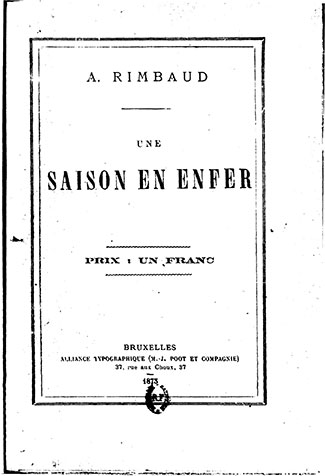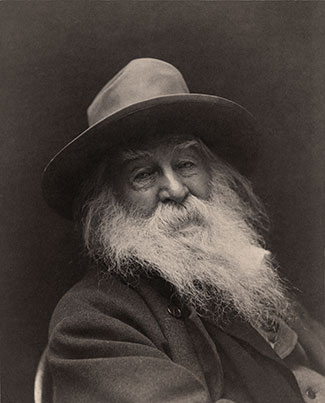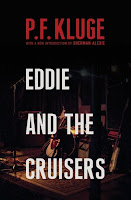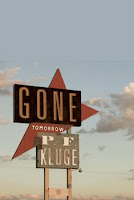new posts in all blogs
Viewing: Blog Posts Tagged with: Eddie and the Cruisers, Most Recent at Top [Help]
Results 1 - 10 of 10
How to use this Page
You are viewing the most recent posts tagged with the words: Eddie and the Cruisers in the JacketFlap blog reader. What is a tag? Think of a tag as a keyword or category label. Tags can both help you find posts on JacketFlap.com as well as provide an easy way for you to "remember" and classify posts for later recall. Try adding a tag yourself by clicking "Add a tag" below a post's header. Scroll down through the list of Recent Posts in the left column and click on a post title that sounds interesting. You can view all posts from a specific blog by clicking the Blog name in the right column, or you can click a 'More Posts from this Blog' link in any individual post.

By: Julia Callaway,
on 7/23/2014
Blog:
OUPblog
(
Login to Add to MyJacketFlap)
JacketFlap tags:
Books,
Music,
Literature,
walt whitman,
Rock and Roll,
Eddie and the Cruisers,
Rimbaud,
Humanities,
*Featured,
TV & Film,
Arts & Leisure,
Kirk Curnutt,
A Historical Guide to F. Scott Fitzgerald,
A season in hell,
P. F. Kluge,
Add a tag
By Kirk Curnutt
Ask folks who came of age in the 1980s what they remember about the movie Eddie and the Cruisers and one of the following responses is likely:
- It spawned the great rock-radio staple “On the Dark Side” and briefly made MTV stars of the improbably named John Cafferty and the Beaver Brown Band.
- It was such a shameless Bruce Springsteen rip-off that Boss fans considered it as sacrilegious as devout Christians do Jesus Christ Superstar.
- It had a whiplash-inducing twist ending that Roger Ebert called “so frustrating, so dumb, so unsatisfactory that it gives a bad reputation to the whole movie.”
- It was a box-office flop that thirty years ago this month shocked Hollywood by becoming a surprise HBO hit.
- It was a movie you rented repeatedly during the decade’s video boom because it fit perfectly VHS’s promise of cheap home entertainment: undemanding, toe-tapping, and eminently re-watchable, it was an ideal 99-cent diversion that helped you forget VCRs cost $500 and were as boxy as Samsonite suitcases.
What you’re less likely to hear, unfortunately: it was based on one of the best, most criminally underappreciated rock ‘n’ roll novels ever.
In a preface to Overlook Press’s 2008 reissue (the book’s first widely available trade paperback), no less than Sherman Alexie admits he never knew Eddie was originally a novel by P. F. Kluge until deep into his own career, long after “obsessing” over the movie as a high-schooler. It’s indicative of how the film overshadows its source material that Kluge’s Eddie doesn’t even make this supposedly comprehensive list of rock novels published since the 1950s.
The novel’s relative obscurity is a shame, for as Alexie notes, it has literary “ambitions and secrets and qualities” that far surpass the movie’s “mainstream” pleasures. Director Martin Davidson, who co-wrote the script with his wife, Arlene, made several changes to Kluge’s tale of a Jersey rock star who may or may not be haunting former bandmates twenty years after his supposed death. The most significant is seemingly the most cosmetic. Whereas Kluge conceived hero Eddie Wilson as a Dion-esque doo-wop rocker, Davidson turned him into an awkward splice of Springsteen and Jim Morrison. In so doing, the filmmaker altered the literary inspiration that in Kluge gives the musician a model for imagining rock ‘n’ roll as an art form instead of mere entertainment. The change is decisive to how differently each version of Eddie depicts the purpose of popular music.

Une saison en enfer, Arthur Rimbaud, Bruxelles, Alliance typographique, 1873. Public Domain via Wikimedia Commons.
In the movie, college dropout Frank “Wordman” Ridgeway, the story’s Nick Carraway, introduces Eddie to the 19th-century French symboliste Arthur Rimbaud. Literature spurs the hunky frontman to make “serious” music instead of cranking out bar-band favorites for Jersey beachgoers: “I want songs that echo,” Eddie insists. “The [music] we’re doing now is like bed sheets. Spread ’em, soil ’em, ship ’em out to laundry. Our songs — I like to fold ourselves up in them forever.” Soon enough, Eddie pens a concept album called A Season in Hell, after Rimbaud’s most famous work. His slimy record-company owner refuses to release it, however, because the music sounds “like a bunch of jerkoffs making weird sounds.” The rejection sends Eddie squealing away in his ’57 Chevy, which hurtles off the Raritan Bridge, either an accident or a suicide. The Cruisers are forgotten for two decades later until an Entertainment Tonight-type reporter begins hyping Hell as an ominous foreshadowing of the late sixties, “a new age, an age of confusion, an age of passion, of commitment!” Suddenly, someone claiming to be the dead rock star is stalking the surviving Cruisers, intent on finally releasing the missing opus so the public can recognize Eddie’s brilliance.
Serious scholarly papers have drawn parallels between Eddie and Rimbaud, but the script’s invocation of the poet never really rises above literary window dressing. Davidson mainly uses Rimbaud to allude to Morrison, who idolized the literary libertine and who, according to a farcical urban legend, faked his 1971 death to escape the rock biz (much as Rimbaud abandoned literature before he was twenty). The movie asks us to believe that the Beatlemania-era Eddie predicted the Dionysian extremes of the Doors’ “The End” or (God help us) “Horse Latitudes,” but the song that’s supposed to illustrate his visionary genius, “Fire,” hardly qualifies as “weird sounds”. It’s merely an arthritic gloss on Springsteen’s “Adam Raised a Cain” with none of the Boss’s blistering vitality.

Walt Whitman. Photo by George C. Cox, restoration by Adam Cuerden. Public domain via Wikimedia Commons.
For Kluge’s Eddie, by contrast, the spirit father isn’t Rimbaud but Walt Whitman, and Eddie’s magnum opus is Leaves of Grass. Having seen Leaves appropriated to do everything from woo interns to expose unlikely meth kingpins, I’ll be the first to say that the Good Gray Poet’s popularity as the Go-To Lit Reference sometimes leaves me craving a Longfellow revival. Yet his role in Kluge isn’t gratuitous. Whitman inspires Eddie to reimagine rock ‘n’ roll as the vox populi, a medium not for becoming famous but for creating the true song of democracy. To produce his rock version of Leaves, Eddie recruits black and white greats from Elvis to Sam Cooke to Buddy Holly (the novel is set in 1957-58, a half-decade earlier than the film). Their mission is to snip the American barbed wire of segregation through a series of secret jam sessions designed to “to bring off the impossible, some fantastic union of black and white music.” What breakthroughs Eddie achieved before his supposed death is as compelling a page-turner as the mystery of who’s harassing the surviving Cruisers. (Spoiler alert: Eddie does not predict “Ebony and Ivory”).
In ditching Whitman for Rimbaud, Davidson’s film became a story not about the Gordian knot of race in American music but about rock-star greatness and fame. That point is bashed home like a gong by the movie’s trick ending, which reveals Eddie is indeed alive but indifferent to the hullaballoo the media creates when his masterwork is finally released. Despite the adaptation’s defects, Kluge speaks appreciatively of it, and rightly so: as a cult favorite, the movie kept the novel’s name alive during the decades the book was out of print. Besides, when the other movie based on your writing is Dog Day Afternoon, you can afford to be generous.
Nevertheless, the lack of attention Book Eddie receives feels like a missed opportunity for rock novels in general. The genre is a diverse, unruly one. Some of its entries are romans à clef that do little more than pencil fictional names into legends rock fans already know by heart (Paul Quarrington’s Brian Wilson-retelling Whale Music). Many others are coming-of-age novels in which that form’s traditional theme of lost innocence plays out like a Behind the Music episode, all downward-spiral cocaine and coitus. Still others are less about music-making than about the grotesquery of fame and fan worship (Don DeLillo’s Great Jones Street). What rock novels aren’t nearly as often about is race — or, at least, the alchemies of ethnic interchange explored in such great nonfiction music histories as Peter Guralnick’s Sweet Soul Music: Rhythm and Blues and the Southern Dream of Freedom (1986). A handful of exceptions do come to mind, Alexie’s own Reservation Blues (1995) most notably. Yet for the most part storylines about ahead-of-their-time geniuses predominate, and frankly, the plot of making personal art instead of appeasing a hits-happy public is as tired as the playlist at my local oldies station.
The idea of rock ‘n’ roll as both the promise and impasse of a racially egalitarian barbaric yawp, on the other hand… That’s a song in fiction we still don’t hear nearly enough.
Kirk Curnutt is professor and chair of English at Troy University’s Montgomery, Alabama, campus, where Scott Fitzgerald met Zelda Sayre in 1918. His publications include A Historical Guide to F. Scott Fitzgerald (2004), the novels Breathing Out the Ghost (2008) and Dixie Noir (2009), and Brian Wilson (2012). He is currently at work on a reader’s guide to Ernest Hemingway’s To Have and Have Not. Read his previous OUPblog posts.
Subscribe to the OUPblog via email or RSS.
Subscribe to only literature articles on the OUPblog via email or RSS.
The post Roll over, Rimbaud: P. F. Kluge, Walt Whitman, and Eddie and the Cruisers appeared first on OUPblog.

 Jeff Schwachter of Atlantic City Weekly has written a wonderful article on the 25th anniversary of the classic rock and roll film Eddie and The Cruisers, based on the novel by P.F. Kluge. Here's a brief excerpt about the book behind the film:
Jeff Schwachter of Atlantic City Weekly has written a wonderful article on the 25th anniversary of the classic rock and roll film Eddie and The Cruisers, based on the novel by P.F. Kluge. Here's a brief excerpt about the book behind the film:
"Many things inspired novelist, freelance writer (Rolling Stone, Life) and northern New Jersey native Kluge to pen the 1980 novel. "Two or three things came together," says Kluge from his office at Ohio's Kenyon College where he has been a teacher for more than a decade. "I always loved early rock 'n' roll ... doo-wop groups basically. ... Those songs just kind of worked their way into me and I've never lost them. I carry them with me [and] the way that they could come back to you all through the rest of your life and haunt you intrigued me. And the second thing was wondering about what happens to the survivors of a group after its star, its leader, perishes."
"[Eddie] is about some tapes that were supposedly made way back when [and] going back into the past to retrieve something, to consider what happened to other people, and what has happened to you and what might have been," says Kluge.
Another inspiration for Kluge's book was southern New Jersey, a landscape the young writer caught only a glimpse of one summer, long ago. "In the summer of 1962, I worked as a reporter -- a sort of summer job -- on the Vineland Times Journal," says Kluge. "And this acquainted me with a New Jersey that was quite different from the New Jersey I knew. Because the northern part of the state is sort of within the field of force of New York City. ... the southern part was entirely different. It was rural. It was eccentric. It was a little mysterious to me: the diners, the traffic circles, the little crossroad towns, the odd pockets of ethnic groups."
"I always liked the fact that the filmmakers did two things," says Kluge. "They stuck with the flashback structure [of the novel] -- so you're cutting back and forth between the present time, where Frank Ridgeway, the Wordman, is a high-school teacher in early middle-age, and going back to the summer on the Jersey Shore maybe two decades or so before. ... I like that they had the integrity to stay with that so that the past and present could play off each other.
"The other thing is [they] could have made it about a surf group in California and they made it in New Jersey," says Kluge. "That pleased me." Kluge always wanted his main character to be from South Jersey. "I think when I sat down to write Eddie in 1980, I realized that I didn't want him to be a suburban kid who was going into Greenwich Village on weekends," says Kluge. "I wanted him to be from that New Jersey 'down south.' And I thought Vineland was a good town for him to be from."
 P.F. Kluge's beloved novel Gone Tomorrow has been selected as a May pick by the San Francisco Public Library: "P. F. Kluge's affecting new novel, Gone Tomorrow, is the story of George Canaris, a writer who spends his career not writing but rather as a creative writing teacher at a small, bucolic Ohio college. (The college is, I suspect, not unlike Kenyon, where P. F. Kluge not only attended as an undergraduate, but where he has taught for a number of years.) This tale of the blessing and curse of an academic life for writers is framed by the search for a long-awaited, possibly non-existent, new novel of Canaris's. He wrote one novel in the 1960s, which brought him fame, fortune, a permanent place on the list of greatest works of fiction of all time, and a tenured position at a small but prestigious college. Then his agent and his publisher, not to mention the president of the college, the head of his department, his students, and his legion of fans, waited--in vain, as it turned out--for the appearance of a second novel, supposedly called The Beast. Finally--and against all the rules of tenure--the college decides to replace Canaris with a younger, more with-it (and productive) writer. What follows forces Canaris (and us) to think about fame, about what's important in life, and about love, loyalty, and the nature of creativity. Canaris is a simply wonderful character; the story of his life is moving, honest, tender and--occasionally--very funny. (When George meets John Henry Mallon, the wunderkind writer of gargantuan novels who replaces him, George reports this exchange in his journal: "'I've read your books,' he said. 'Great.' 'I've lifted yours,' I responded. 'Heavy.'") This is a good choice for readers who enjoy character-driven novels, but it's a must read for anyone who's spent any time in the world of academe. Kluge knows whereof he writes."
P.F. Kluge's beloved novel Gone Tomorrow has been selected as a May pick by the San Francisco Public Library: "P. F. Kluge's affecting new novel, Gone Tomorrow, is the story of George Canaris, a writer who spends his career not writing but rather as a creative writing teacher at a small, bucolic Ohio college. (The college is, I suspect, not unlike Kenyon, where P. F. Kluge not only attended as an undergraduate, but where he has taught for a number of years.) This tale of the blessing and curse of an academic life for writers is framed by the search for a long-awaited, possibly non-existent, new novel of Canaris's. He wrote one novel in the 1960s, which brought him fame, fortune, a permanent place on the list of greatest works of fiction of all time, and a tenured position at a small but prestigious college. Then his agent and his publisher, not to mention the president of the college, the head of his department, his students, and his legion of fans, waited--in vain, as it turned out--for the appearance of a second novel, supposedly called The Beast. Finally--and against all the rules of tenure--the college decides to replace Canaris with a younger, more with-it (and productive) writer. What follows forces Canaris (and us) to think about fame, about what's important in life, and about love, loyalty, and the nature of creativity. Canaris is a simply wonderful character; the story of his life is moving, honest, tender and--occasionally--very funny. (When George meets John Henry Mallon, the wunderkind writer of gargantuan novels who replaces him, George reports this exchange in his journal: "'I've read your books,' he said. 'Great.' 'I've lifted yours,' I responded. 'Heavy.'") This is a good choice for readers who enjoy character-driven novels, but it's a must read for anyone who's spent any time in the world of academe. Kluge knows whereof he writes."
 Susan Stamberg of NPR's Morning Edition talked to independent booksellers across the country this morning about their picks for the holidays. On the list is P.F. Kluge's Gone Tomorrow: "In the tradition of Richard Russo's Straight Man, P.F. Kluge alternates between humor and poetic examinations of the academic pursuit, along the way touching on the basic elements of love, commitment to career and friendship." Click here to read an excerpt, and listen to Morning Edition's Bookseller's Picks for Holiday Lists!
Susan Stamberg of NPR's Morning Edition talked to independent booksellers across the country this morning about their picks for the holidays. On the list is P.F. Kluge's Gone Tomorrow: "In the tradition of Richard Russo's Straight Man, P.F. Kluge alternates between humor and poetic examinations of the academic pursuit, along the way touching on the basic elements of love, commitment to career and friendship." Click here to read an excerpt, and listen to Morning Edition's Bookseller's Picks for Holiday Lists!
 We love Sarah Weinman's Confessions of an Idiosyncratic Mind blog on crime fiction and mysteries, and we are thrilled that one of her picks of the week is P.F. Kluge's legendary Eddie and the Cruisers. Now available in a new paperback edition from Overlook, with an amazing introduction by Sherman Alexie, this is essential reading for the rock and roll generation. Here's Sarah's thoughts: "How many ways can I recommend what ought to be a permanent resident of the modern canon? I'll stick to one: I was browsing in an independent bookstore and thought I'd read the first chapter. I ended up storming through the first 2/3rds before I had to leave, buying in haste and in a cranky and foul state because I couldn't finish it up until later that night. The writing is pitched perfectly and the pacing is sublime, but most of all, it puts in your head the kind of music that makes you want to rise up and do something amazing with your life."
We love Sarah Weinman's Confessions of an Idiosyncratic Mind blog on crime fiction and mysteries, and we are thrilled that one of her picks of the week is P.F. Kluge's legendary Eddie and the Cruisers. Now available in a new paperback edition from Overlook, with an amazing introduction by Sherman Alexie, this is essential reading for the rock and roll generation. Here's Sarah's thoughts: "How many ways can I recommend what ought to be a permanent resident of the modern canon? I'll stick to one: I was browsing in an independent bookstore and thought I'd read the first chapter. I ended up storming through the first 2/3rds before I had to leave, buying in haste and in a cranky and foul state because I couldn't finish it up until later that night. The writing is pitched perfectly and the pacing is sublime, but most of all, it puts in your head the kind of music that makes you want to rise up and do something amazing with your life."
 Janet Maslin reviews Gone Tomorrow in The New York Times: "A sharply observed yet tender novel of academic life and its many sand traps, P. F. Kluge (himself a writer in residence at Kenyon College, which is the subject of his nonfiction book “Alma Mater”) uses the persona of Canaris to describe the dangers that a writer-teacher faces. Even that job description defies reason. Why is it that “in the same way that people assume an opera singer can handle folk music or a four-star chef can preside over a short-order grill, it is assumed that a writer can teach writing”? The first and perhaps greatest danger about which Gone Tomorrow warns is that of getting too comfortable inside a college’s cozy microcosm. Finally, in a turn that might have tickled Canaris had he lived to see it, “Gone Tomorrow"is a good title. Too good. Mr. Kluge’s “Gone Tomorrow” is already being outsold on Amazon.com by Lee Child's “Gone Tomorrow,” a Jack Reacher thriller that doesn’t come out until May. Should any of Mr. Child’s devotees order the wrong novel by mistake, they’ll still get a book about a sharp-eyed, solitary troublemaker. They probably won’t be sorry."
Janet Maslin reviews Gone Tomorrow in The New York Times: "A sharply observed yet tender novel of academic life and its many sand traps, P. F. Kluge (himself a writer in residence at Kenyon College, which is the subject of his nonfiction book “Alma Mater”) uses the persona of Canaris to describe the dangers that a writer-teacher faces. Even that job description defies reason. Why is it that “in the same way that people assume an opera singer can handle folk music or a four-star chef can preside over a short-order grill, it is assumed that a writer can teach writing”? The first and perhaps greatest danger about which Gone Tomorrow warns is that of getting too comfortable inside a college’s cozy microcosm. Finally, in a turn that might have tickled Canaris had he lived to see it, “Gone Tomorrow"is a good title. Too good. Mr. Kluge’s “Gone Tomorrow” is already being outsold on Amazon.com by Lee Child's “Gone Tomorrow,” a Jack Reacher thriller that doesn’t come out until May. Should any of Mr. Child’s devotees order the wrong novel by mistake, they’ll still get a book about a sharp-eyed, solitary troublemaker. They probably won’t be sorry."
 Jennifer Reese gives Gone Tomorrow a high grade in this week's Entertainment Weekly: "George Canaris, the narrator of P.F. Kluge's sparkling new novel Gone Tomorrow, is a famous writer who takes a job teaching at a small Ohio college — and for the next three decades talks about (but fails to publish) his next big book, a mysterious project that he refers to as ''the Beast.'' What, exactly, has Canaris been doing all these years, and what is the nature of the Beast? These are the questions Kluge entertains in this witty and astute tragicomedy about academia and the trajectory of an artist's life. B+ "
Jennifer Reese gives Gone Tomorrow a high grade in this week's Entertainment Weekly: "George Canaris, the narrator of P.F. Kluge's sparkling new novel Gone Tomorrow, is a famous writer who takes a job teaching at a small Ohio college — and for the next three decades talks about (but fails to publish) his next big book, a mysterious project that he refers to as ''the Beast.'' What, exactly, has Canaris been doing all these years, and what is the nature of the Beast? These are the questions Kluge entertains in this witty and astute tragicomedy about academia and the trajectory of an artist's life. B+ "
 P.F. Kluge, author of the forthcoming Gone Tomorrow and Writer-In-Residence at Kenyon College, will speak at Bloomberg News in New York on October 7 at 7pm. Kluge will present "First and Not Quite Last Thoughts On a Small College in Ohio," which, coincidentally, is the setting for his new novel. For more information on this event, please visit the Kenyon College site.
P.F. Kluge, author of the forthcoming Gone Tomorrow and Writer-In-Residence at Kenyon College, will speak at Bloomberg News in New York on October 7 at 7pm. Kluge will present "First and Not Quite Last Thoughts On a Small College in Ohio," which, coincidentally, is the setting for his new novel. For more information on this event, please visit the Kenyon College site.
 P.F. Kluge, author of Eddie and the Cruisers, Biggest Elvis, and the forthcoming Gone Tomorrow (Fall 2008) was recently profiled by Joe Blundo of the Columbus Dispatch. Novelist, journalist, and teacher, Kluge is writer in residence at Kenyon College.
P.F. Kluge, author of Eddie and the Cruisers, Biggest Elvis, and the forthcoming Gone Tomorrow (Fall 2008) was recently profiled by Joe Blundo of the Columbus Dispatch. Novelist, journalist, and teacher, Kluge is writer in residence at Kenyon College.
His new novel, Gone Tomorrow, received this notice from Publishers Weekly: "In Kluge’s thoughtful new novel, Mark May, a young professor at an Ohio college, is surprised to be named the literary executor of a recently deceased colleague he barely knew. George Canaris was a literary sensation in the 1960s, but hadn’t published anything in 30 years. At the time of his death, he was rumored to be working on his magnum opus, but there is doubt the manuscript exists. While inspecting the dead man’s house, Mark finds the manuscript of Canaris’s memoir, which provides insight into the man and his work, and even if Mark has doubts about its veracity, it pushes him to arrive at some important decisions about his own life. The novel is suffused with Kluge’s obvious affection for books, and has some cleverly aphoristic things to say about the joys of teaching, the pitfalls of academic infighting and the tragedy of artistic expectations left unfulfilled."

bow wow wow yipee yo yipee yay. bake homemade dog biscuits with your kids, they can shape them into whatever they'd like! then find a local shelter where you can drop them off, or hand them out at a dog park, adoption or to friends. friends who have dogs, that is.
2 cups whole-wheat flour
1 tbsp baking powder
1 cup peanut butter - chunky or smooth
1 cup milk
preheat oven to 375F. mix flour and baking powder, set aside. in another bowl mix peanut butter and milk, then slowly add dry ingredients. place dough on a lightly floured surface (this is the part kids love) and knead dough. roll out and shape with cookie cutters or freehand. bake 20 minutes - be careful as they burn easily. cool and store in an airtight container.
the lesson: i think it's sometimes easy for kids to relate to animals. they seem to have intense feelings about pets (even those that are not their own) who might be lost or hurt or homeless. if we see a sign posted in the neighborhood for a lost animal, my son insists we drive around looking. while you bake, it would be easy to talk to them about showing kindness to others, be they 2 legged or four.
here's a link: find your closest shelter













